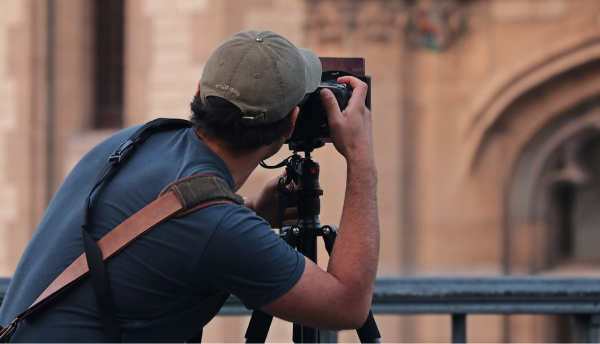- How to Start a Photography Business
How to Start a Photography Business

If you have a passion for photography, you may be able to turn this hobby into a part-time or even full-time job. Of course, while the sophisticated cameras on today's smartphones may make it seem like anyone can be a photographer, the truth is that starting a photography business takes talent, determination, and an understanding of how to run and market your own business. But as much as the market can be competitive, with a bit of effort, many photographers have managed to carve out their own niches and enjoy sustainable careers in this field.
Calculating the Startup Costs
While you can take great pictures with a smartphone, a professional photographer needs better equipment than that. When you're starting out as a photographer, you don't have to buy the best camera on the market right away, but you will need a good SLR model that lets you manually adjust settings and add different lenses as needed. Do some research to determine which one best suits the type of photography you want to specialize in. You'll also likely want a tripod and a reliable camera bag. If you're starting a business in portrait photography, you'll also need to invest in lights and backdrops. You may be able to save money on equipment by buying used gear: Remember, you haven't made any money yet, so you should do what you can to avoid debt, at least until you start turning a profit from your business. You can always upgrade your equipment later on, as your business grows.
A key aspect of how to begin a photography business is handling the legal details before you take on your first clients. At a minimum, you have to do the paperwork to start a business in your state, which will give your business a more professional image as well as help you to take advantage of tax benefits and more easily secure a loan if you need one.
Do I Need an LLC for Photography?
You don't strictly need an LLC for photography, but starting a photography LLC is a good idea. While you can get by as a sole proprietor, starting a photography LLC will give you protection from liability that can keep your assets safe in the event of an unforeseen mishap.
How to Establish Your Brand and Have a Good Reputation
Once your business exists on paper, set up a website that reinforces your brand. For instance, if you're going to focus on shooting weddings, school portraits, or newborn babies, you'll want your website to have a look and feel that fits what you do.
Once you're in business and taking clients, a lot of your business will depend on your reputation, both with clients and with other vendors. You can build a good reputation both by doing good work and by being prepared and professional. That means that when you have a shoot scheduled, you should always be early for the appointment, and you should always bring everything you might possibly need with you. That includes things like extra memory cards and even a backup camera, once you can afford one. You don't want to fail to capture someone's special moment because of an equipment malfunction! And once the job is done, always deliver the product as agreed upon and in a timely manner.
As you build your brand, you'll want to build relationships, too. For instance, if you're a wedding photographer, make friends with other wedding vendors, including your competitors as well as people like videographers, event planners, and DJs. As you build a reputation for doing good work, you'll attract more clients from positive reviews, but you may also be able to pick up work from other vendors' referrals. Make sure to return the favor, too; for instance, if you're busy when a potential client wants to book you, recommend another photographer who you've built a relationship with.
Use Contracts With Clear Expectations
Always use a well-written contract to ensure that both you and your clients know what to expect. The contract should include details of the work that will be performed, such as how many hours of shooting time you're needed for, what time you need to arrive and where, and what the end product will be (are you providing digital files, prints, or both?). If you're shooting a long event like a wedding, make sure that you have a complete timetable of the day. Also, have the client give you a shot list if there are specific poses, subjects, or settings that are must-haves. Of course, the contract should also include how much you'll charge for your services, the forms of payment you accept, and how you must be paid (all at once or in set amounts at specific times leading up to the event). You should also communicate with your clients about whether you'll include a copyright release, which will allow them to make their own prints of your work. If you're up-front about what to expect from your services, you're much more likely to satisfy your clients.
Where Do You Find Work?
When you run your own photography business, you'll need to work hard to find clients. If you're just getting started as a photographer, you may need to take work as a second shooter for another photographer until you can build your own portfolio. Then, you can market yourself online, both through your business website and on social media sites. You may also be able to find photography jobs on sites that focus on freelance work or sites where people look for reviews of event vendors.
A photography business can be very rewarding if you venture into it with passion, determination, and a willingness to put in the effort needed to succeed. It's rewarding work to be the person who captures clients' most important memories.